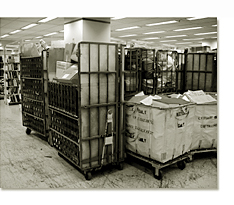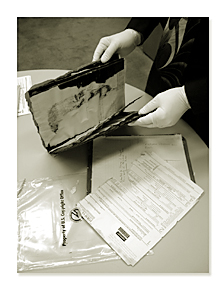Annual Report 2002: Postal Mail Disruption
|
Annual Report 2002: Postal Mail Disruption |
In October 2001, anthrax-contaminated
envelopes arrived in some Congressional offices. These incidents caused
a one-week closure of Capitol Hill buildings (October 18–24, 2001),
including the James Madison Memorial Building of the Library of Congress
where the Copyright Office is located. As the single largest recipient
of mail in the Library of Congress, the Copyright Office felt a significant
impact from the anthrax incidents. Postal mail deliveries were severely
disrupted between October 18, 2001, and March 4, 2002, resulting in a
serious shortfall in fee receipts during the first half of the fiscal
year. Postal mail, rerouted to special facilities, received irradiation
to destroy any possible anthrax contamination. Delivery of delayed mail
picked up significantly in late April, and was completed by the end of
July. By the end of Fiscal Year 2002, the Office had processed all six
months worth of the delayed mail. The processing of this mail, however,
affected the Office’s processing of current incoming mail.
 In response to the mail delay, the Office adopted an interim regulation in December 2001 to address the effect of the general disruption of postal services on the Copyright Office’s receipt of deposits, applications, fees, and other materials. The regulation provided that persons who sent materials to the Office and believed the Office’s receipt of those materials had been delayed may submit evidence that the materials would have been received in the Office by a particular date but for the disruption or suspension. Based on the evidence submitted, the Office may assign a receipt date based on the date on which the materials would have been received had there been no disruption. Invoking section 709 of the copyright law (title 17 of the United States Code), the Register announced a determination that there had been a general disruption or suspension of postal services commencing on October 18, 2001. This determination remained in effect at the end of the fiscal year. The Effective Date of Registration (EDR) for copyrighted works is normally determined by the date the application, deposit, and correct fee are received in the Copyright Office. As of February 2002, the Register made a procedural determination that, for delayed postal mail, the EDR would be calculated as a specific number of days after the postmark, generally when it would have been received had the mail not been delayed. The Copyright Office’s website provided notification to the public of the disruption and suggested use of private carriers. Private carrier deliveries doubled as a result, becoming the primary method of mail receipt during the period of disruption.
 Irradiation of delayed mail, causing high temperatures, subjected some photographs, videotapes, audiocassette tapes, and CDs to unreconstructable damage. The Office established a “triage” area to deal with damaged claims. Damaged filings from newly received mail continued through the end of the fiscal year. The Licensing Division prepared notices about the postal disruption and sent copies to all cable television systems with outgoing Digital Audio Recording Technology (DART) and satellite carrier forms and with all Licensing Division correspondence. Copyright owners who qualify for royalties must file claims with the Copyright Office each year in order to receive a portion of the royalties collected the preceding calendar year under sections 111 and 119, and chapter 10, of the copyright law. The regulations require that a claimant either mail the claim or hand-deliver it to the Office of the General Counsel during the appropriate filing period. Because of the anthrax incidents, the Copyright Office announced in February and April 2002 that it would waive its mailing requirement and offered several additional means for delivering a cable, satellite, or DART claim to the Office, including an electronic submission of the claim or, in the case of the DART claims, a facsimile submission of the claim. The Office responded to problems of deposit accounts that went into “no funds” status because of undelivered replenishment checks, checks that became uncollectible after a certain time period, and refunds resulting from double payment of fees. The Office also established a method to replenish deposit accounts by credit card. In January 2002, the Congress responded to the terrorist and anthrax attacks by authorizing security-related supplemental funding to various agencies. The Copyright Office requested and received $187,386 in this special security supplemental to fund overtime expenses to process mail and to purchase protective equipment for mail handlers. As the Copyright Office obtains some two-thirds of its
budget from fees for services, the ongoing mail disruption had an impact
not only on service to users, but also on the flow of receipts to the
Office. On the basis of seriously reduced first quarter fee receipts,
the Office estimated a potential $7.5 million shortfall in fee receipts
for the fiscal year, about one-third of the total yearly receipts. In
February, the Office requested $7.5 million in fy
2002 supplemental funding to cover a possible receipt shortfall.
The request was approved as part of a government-wide supplemental appropriation
that passed the Congress and was signed by the President in August 2002.
|